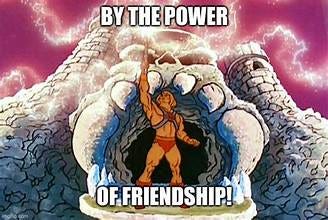You can’t win your bike lane, new bus route, or pedestrian plaza alone – you need people on your side. Talking with strangers is a critical part of winning any campaign for transportation change, but reaching out to people you don’t know about something you care deeply about can be intimidating. It can feel uncomfortable, risky, or be so outside of your experience that it’s hard to picture what the interaction might be like. Comfort with talking to strangers about your idea is a learnable skill, but if that step feels like too big of one for you to take at the moment, you have other options. Organize with your friends! While getting politically involved with your friends is not inherently easier than working with strangers, it is different in a way that you might find easier. Here are some ways to make it work with you, your friends, and your transportation goals!
Align with their values. Your friend might not care about bikes, transit, or street safety like you do, but you do have some connection. Your friendship is based on something. Whether that’s an activity, neighborhood, fandom, or something else – you have a connection. Find the part where your values align on that thing and tie it back into your transportation advocacy. A great part about transportation advocacy is it can be connected with nearly anything else in some way. Even if your friend is totally obsessed with cars, belong to a car club, and couldn’t give a fig about your transportation interests– they might be up for organizing a classic car festival downtown with you. A classic car festival, that involves shutting down a downtown road to car thru traffic is still a big win for transportation advocates who want to highlight that we can reimagine road space for people rather than cars. Yes, in this example, cars are the thing on display, but demonstrating that shutting down a downtown road to thru traffic isn’t the end of the world helps bolster future arguments you might make about limiting car thru traffic on that street.
Align with their “theory of change”. Political change happens in all sorts of ways though you and your friends might disagree on what is the most important way of making change. You might have different opinions on the impact of electoral politics, speaking out at official government processes, culture shifting, or direct action. You don’t need to be perfectly aligned on your theories of change, you need to find an activity that both of you agree would make some sort of impact. Maybe you think direct action is the top way to win a bike lane and they think that insider politics is best, but you both agree that raising awareness of something you both like is helpful. So, do something together that raises awareness about that thing.
Make it easy to say yes to! Projects that are low-time commitment, straightforward, and 1-offs are generally easier for people to say yes to than time-intensive, convoluted, and ongoing projects. In the case where you overlap on the importance of raising awareness, don’t invite them to start a podcast or something else with an ongoing commitment. Make a flyer together or put together a low-key event. What are the different skills you both have and how could you combine them in interesting ways?
Make it easy to say no to. Don’t strain your friendship by putting them in a difficult position. Assume that they will say “nah” to you and be gracious about it. When you do invite them to join you in your transportation advocacy, like by asking them to co-host a bus-based bar crawl, give them an easy out to say “no.” Don’t make it weird.
Be flexible about what their engagement looks like. If they want to co-organize a thing with you, great. If they want to help you execute on an idea of yours, wonderful. If they want to just walk with you while you put up posters, that’s fine too. Everything is helpful, and be open to accepting what they’re able to offer.
Make it fun or exciting. Prioritize the friendship over the advocacy. Make the activity something that strengthens your friendship even if that means it has a sub-optimal political impact. Pretty much anything you do in transportation advocacy moves the needle, so it’s ok if you don’t do “the perfect thing.” It’s ok to do something that was mainly fun with your friend and has a small impact. Who knows, maybe they’ll like it so much they want to try again!
The biggest upside to our current state of biking and transit is that there are a lot of improvements we can win. Every win takes work and time. If you are having a hard time getting started or taking that next step, invite a friend along with you. Whether they join you for a step or the whole journey, it’s better with them around.
Need help winning transportation changes in your community? I’m here to help! Whether you want a 1-on-1 training session or a group workshop, let’s talk. Email me at Carter@carterlavin.com to set something up. Here’s a bit about what training sessions are like.
**4 FREE ADVOCACY COACHING SESSIONS AVAILABLE**
An Upstate New Yorker wants stronger pro-transit, bike & pedestrian advocacy in the region so they donated enough to cover 10 advocacy coaching sessions for budding advocates in the area! I’ve already conducted sessions with advocates in Syracuse, Buffalo, and Rome (NY), and a few more sessions have been claimed but four free sessions remain. Must be in Upstate NY. Email me at carter@carterlavin.com if you are interested.
Donate to help get more bike, pedestrian and transit activists trained across the country!
Interested in sponsoring the training of an activist working on an issue you’re passionate about? Let’s chat. Carter@carterlavin.com
Want to take a peek behind the curtain of this advocacy training work? Sign up for my quarterly newsletter here.


